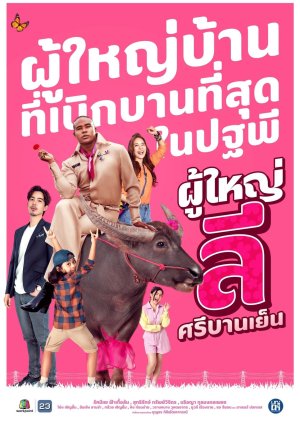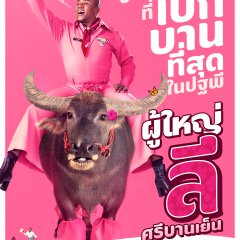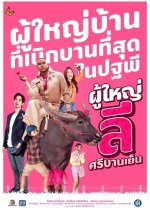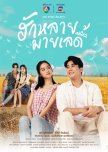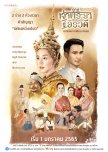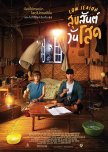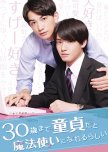Somboon wants to pass on the position of town headman to one of his children. However, his daughter Khaomai isn't ready for this. As such, the position must fall to his son Khaosali, a famous makeup artist under the name "Lina." Khaosali must now return to his hometown to run in the election. His main competitor is Bank whose mother Nual is a notorious loan shark. (Source: Thai = workpointtoday.com || Translation = thaidramatic_update on Instagram; edited by kisskh) Edit Translation
- English
- magyar / magyar nyelv
- עברית / עִבְרִית
- dansk
- Native Title: ผู้ใหญ่ลีศรีบานเย็น
- Also Known As: Phuyai Li Sribanyen
- Screenwriter: Watt Suphasawatt Purnaveja, Pannut Wongwajrakamol, Aef Jirawat Charncheaw
- Director: Boonyathorn Kitiphattakon
- Genres: Comedy
Where to Watch The Cheery Lee, Village Headman
Subscription (sub)
Cast & Credits
- James Rusameekae FagerlundLee / Lina / KhaosaliMain Role
- Gee Sutthirak SubvijitraBankMain Role
- Yada Narilya GulmongkolpechKhaomaiMain Role
- Seo Ji YeonPhakkadSupport Role
- Somcheng Bunyawan Phongsuwan"Nual" SrinualSupport Role
- Arthur PotjesKhaophodSupport Role
Reviews

Comedy lakorn with modern ideas and a lot of convenient writing
Before I say anything else, let me admit that I am just starting to dip my toes into mainstream Thai television. This means that, as a Western European viewer, I can't really say how this series compares to mainstream Thai lakorns. Everything in this review is just based on my own feelings and what little I know about Thai society.Anyway, my tl;dr:
Was it good? -- It had quite a bit of convenient writing and a few dated jokes, but the good outweighed the bad for me.
Did I like it? -- Yes, it was what I needed at the time, something funny, engaging but not too hard on the brain. Also, the two romantic subplots were not the main focus of the drama, but were still well integrated into the main plot.
Would I recommend it? - I don't know. I'd have to know more about other mainstream productions.
What I am quite sure of, however, is that to review this lakorn is to understand that it was broadcast on weekdays at 7pm -- which means that its target audience are normal families at the end of a busy work and school day. They will want to watch something that isn't too much outside the expected norms, something that provides a bit of escapism, something that is relaxing, relatable and funny.
Another thing to be expected, given the genre, is the low budget and the resulting narrow range of sets and inconsistencies. Actually, the people in charge did a good job of keeping track of all the colourful costumes worn by Leena and Khaomai -- unfortunately I noticed this mostly because of Gee's ("Bank") ever-changing hair length. (Really, from episode 14 or so, I started to notice the order in which they shot the series, just by how long his hair was.)
As for the mix of progressive and outdated aspects, I think the writers tried to write a modern lakorn that would still appeal to the mainstream audience, so in the end, we got a lakorn that had both cliched plot points, some outdated "jokes" and a few messages of democratic principles, equality and humanity.
The main character, who is กะเทย "gàthoey" -- the concept seems to be quite different from the neat western boxes of "gay" / "trans", so for the purposes of this review I'll just describe him as "effeminate gay man" and use the Thai word from now on -- is himself a mixture of stereotypical and progressive. Just alone the fact that he *is* the main character, and not a side character to be made fun of, I find progressive in itself. But then they went a step further, and cast James Rusameekae, whose body is large and whose skin is dark -- so he is not even stereotypically gathoey in terms of looks; just in terms of how he dresses, moves and speaks.
In the course of the drama, the script addresses homophobia and colorism very respectfully -- but it's a minor aspect of the show. Instead, Lee / Salee / Leena is shown as a person who loves his village very much, who is willing to fight for justice and who has his own flaws, none of which have anything to do with his being gathoey or his skin colour.
However, there are three scenes where the writers slide back into the old habit of making homophobic "jokes" -- two of them between Leena and his father, which makes it all the more distasteful.
Similarly, the two main young women in the drama, Khaomai and Pakkad, are both modern young women, one with a thriving business, the other with a clear purpose in her life, both are shown as equals to their respective romantic partners -- and, at the same time, Pakkad is written as someone who is not very smart and, in the first half of the drama, as someone who pursues a man based on superficial attraction, and Khaomai gets her own "hysterically demands a course of action that goes against all common sense" plot line, even though she is usually a very level-headed young woman.
One of them is the one to propose when the time comes (instead of the male love interest) -- and then, in the end, both are left to stay in the village while all three of the men go out into the world to learn.
There is a lot of convenient writing, and the plot develops "because the writers said so" -- some of the problems could easily have been avoided if Lee and his assistants had just sat down for an hour or two and made a plan, instead of running around like headless chickens. The villains are easily recognisable villains, we have the expected roles of "old man with a rough exterior and a heart of gold", "mother who will do anything for her son", "plucky child", several easily forgotten "villagers" and so on. The subplots are easily predictable, and where there aren't, it's more often than not either because of a sudden plot twist to make things more difficult for the characters or a deus-ex-machina solution. Overall, these things are more or less what I expect from a comedy series that is filmed to be shown in the early evening on a weekday.
On the other hand, the writers not only included the most interesting character of Salee, but they also mentioned democratic rights, a discussion of what is right and wrong, ordinary people fighting against corrupt officials; they raised the question of what kind of development might be good for rural areas. Considering that Thailand is still a very fragile democracy, with a score of 34/100 (a rank of 107 out of 180 countries) in the Corruption Perceptions Index 2024 (https://www.transparency.org/en/countries/thailand), I think the Thai audience might appreciate this differently from a Western viewer.
This strange mix of progressive character traits and tropey writing confused me a bit -- but the writers managed to make me care for the main cast, who all had their loveable traits and their flaws, so much that I can overlook these not-so-good things.
Overall, I liked it for what it was. Could it have been better? Yes. But it could have been so much worse. For me, it was exactly what I needed, which was a bit of escapism.
Was this review helpful to you?
Recent Discussions
Be the first to create a discussion for The Cheery Lee, Village Headman

